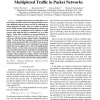Free Online Productivity Tools
i2Speak
i2Symbol
i2OCR
iTex2Img
iWeb2Print
iWeb2Shot
i2Type
iPdf2Split
iPdf2Merge
i2Bopomofo
i2Arabic
i2Style
i2Image
i2PDF
iLatex2Rtf
Sci2ools
INFOCOM
2000
IEEE
2000
IEEE
Effective Envelopes: Statistical Bounds on Multiplexed Traffic in Packet Networks
Abstract--A statistical network service which allows a certain fraction of traffic to not meet its QoS guarantees can extract additional capacity from a network by exploiting statistical properties of traffic. Here we consider a statistical service which assumes statistical independence of flows, but does not make any assumptions on the statistics of traffic sources, other than that they are regulated, e.g., by a leaky bucket. Under these conditions, we present functions, socalled local effective envelopes and global effective envelopes, which are, with high certainty, upper bounds of multiplexed traffic. We show that these envelopes can be used to obtain bounds on the amount of traffic on a link that can be provisioned with statistical QoS. A key advantage of our bounds is that they can be applied with a variety of scheduling algorithms. In fact, we show that one can reuse existing admission control functions that are available for scheduling algorithms with a deterministic service. W...
| Added | 25 Aug 2010 |
| Updated | 25 Aug 2010 |
| Type | Conference |
| Year | 2000 |
| Where | INFOCOM |
| Authors | Robert Boorstyn, Almut Burchard, Jörg Liebeherr, Chaiwat Oottamakorn |
Comments (0)

